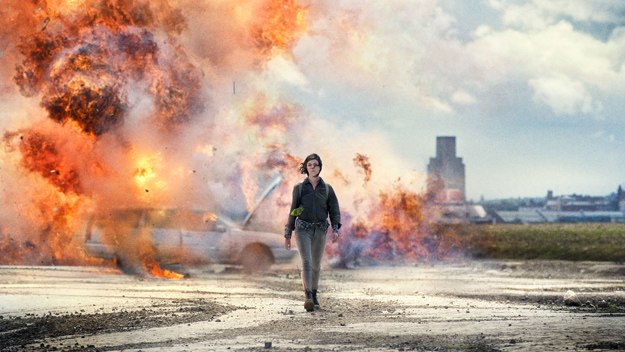The Utopia Experiment
Where is Jessica Hyde? This is the central question of Channel 4’s unique, somewhat experimental six-part series Utopia. This series has attracted my attention by coincidence, but I’m glad it did – it’s been a long time since I have seen something to utterly weird and compelling. The central characters of the show are a group of comic book fans who know each other from an online chatroom. They are united in their obsession for a mysterious comic called “The Utopia Experiments”, which was written by a mad men in a psychiatric ward. When it is discovered that there may be a previously secret second part to the comic, the fans decide to meet in real-life. However, a likewise mysterious and seemingly omnipresent organization called “The Network” is also after the comic and sends out its ruthless bloodhounds to track down the comic, killing everyone who is in their way.
Nobody is safe. The Utopia fans realize this and have to leave their lives behind, embarking on a seemingly endless road trip to remote hide-outs. Naturally, the colorful ensemble is what makes the show tick. Becky is a hypochondriac who is convinced the death of her father has something to do with the Utopia manuscript. She also has a delightful Welsh accent. Wilson Wilson is a hacker and conspiracy theorist and contributes a large amount of paranoia to the group. Ian is a somewhat more relaxed IT guy who still lives with his mother. Grant is an 11-year old boy who pretended to be older on the forums, but is dragged into the conspiracy when he is hunted and later framed for mass murder. Michael is a civil servant who is haunted by difficult decisions and later blackmailed by The Network, he also has a delightful accent, in this case a Scottish one. At the center of course is the enigmatic Jessica Hyde, who appears to have a lot of knowledge about the ruthlessness of The Network.
The mysterious members of The Network itself are revealed over the course of the series. They are portrayed as obscure old men surrounded by darkness – quite literally, as the room they usually appear in is paneled with deeply dark wood. Color is a central element of the series and shapes its entire atmosphere. Every subplot and/or scene appears to have its own color scheme – usually they are extreme colors which mirror the brutality of the series. It adds an optical layer which makes this show even more interesting to watch, despite its harsh and violent ambiance. This also applies to the quirky music. It is unusual, a novelty for a TV series, but surprisingly enjoyable. Utopia is an experience for the senses, but a paradoxical one. At times it is so brutal that you might reach a point where you ask yourself if this is really necessary. However, once you get over ‘the spoon’ and get sucked into the arcane conspiracy, its grip will not let you go. It will take you to strange emotional places; mostly emotions of dread and despair. There is no way to escape, you are trapped like a rabbit by a predator. The paradoxical nature of the series, as that of humans enjoying horror fiction, will keep you watching.

Utopia dares to be different in all aspects. It does things which about 90% of TV series would never do out of fear of alienating viewers. Perhaps the series itself is an experiment to figure out how much an audience can take?! Utopia has a complete in-your-face mentality, aptly accompanied but the otherness of its visuals and its score. Despite the controversy surrounding several of its subplots, it has been renewed for a second season. I’m not quite sure what I can expect of a second season, since the first season is an accomplished story in itself. Perhaps the central question of season two will be “What is Jessica Hyde?”. I’ll be watching.


One Response